Kate Leibfried's Blog, page 12
January 11, 2013
Now showing....on television!
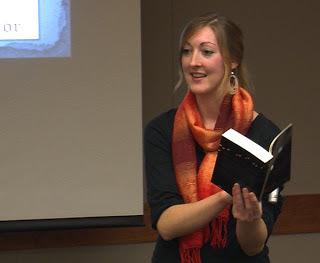 My presentation on self-publishing last month went phenomenally well! Lots of support from the folks in my hometown and tons of intelligent, thoughtful questions. I spoke on the radio while I was there (KAXE) and was also filmed by ICTV.
My presentation on self-publishing last month went phenomenally well! Lots of support from the folks in my hometown and tons of intelligent, thoughtful questions. I spoke on the radio while I was there (KAXE) and was also filmed by ICTV. I plan on covering some of the main points of my self-publishing talk on the blog soon. Stay tuned! And please, ask questions. If you're not learning, you're not living!
-Kate
Published on January 11, 2013 12:43
January 6, 2013
Sometimes You Just Need a Lil' Haiku
Published on January 06, 2013 13:26
December 30, 2012
Eating Moments and Feeding Off Memories
The holidays have slid past us once again. And it's easy to forget about the little things that make them special--the family dinners, the effort your friend took to buy you the perfect gift, the warm well-wishes of strangers at the Target check-out. We bask in the glow of the holidays and then let it slip away. And then it's just winter. And then it's just cold and gray and the car won't start and the sidewalk needs to be shoveled and the dog has to be walked...
Definitely easy to forget about sitting around the fireplace with your family and loved ones and laughing about that time your brother peed in one of the display toilets at Ace Hardware when he was five years old (right, Josh?).
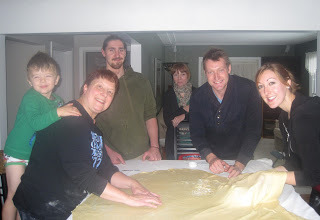 I say, don't forget. I say cling to those memories like they are the daily bread and water that sustain you. Not that you should dwell on the past, but you shouldn't just dismiss it like yesterday's newspaper. Keep a clipping. Log away a memory. People tend to ruminate on bad experiences far more than good ones (New York Times, March 23, 2012), so it is important to consciously keep a store of positive memories at the front of your brain. When times are shitty and you swear your fingers are going to snap off one-by-one from the cold, picture a warm thought. One of mine comes from this past Thanksgiving.
I say, don't forget. I say cling to those memories like they are the daily bread and water that sustain you. Not that you should dwell on the past, but you shouldn't just dismiss it like yesterday's newspaper. Keep a clipping. Log away a memory. People tend to ruminate on bad experiences far more than good ones (New York Times, March 23, 2012), so it is important to consciously keep a store of positive memories at the front of your brain. When times are shitty and you swear your fingers are going to snap off one-by-one from the cold, picture a warm thought. One of mine comes from this past Thanksgiving.
I ventured north to Duluth (like I do almost every Thanksgiving) and stayed with my aunt and uncle. Thanksgiving is my favorite holiday anyway, but this year was extra-special. We made potica. Maybe some of you with Slovenian ancestry know what I'm talking about. For those of you who don't, here's the deal: It's a type of sweet bread that basically takes all day to make. You prepare the dough, let it sit, roll it out on a table, stretch it (by hand, pulling from the middle) so that it is crepe-paper thin, and then cover it with walnuts, honey, and other sweet goodness, roll it up into a doughy snake, then coil it and bake. And then enjoy. It's absolutely delicious and really, pretty fun to make.
So, that's one memory that will feed me for a while. Good luck finding yours.
-Kate
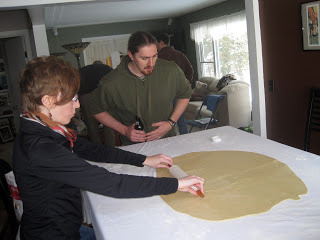
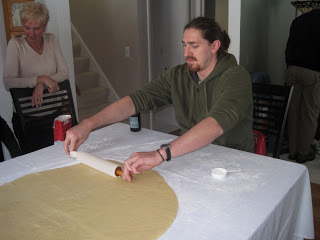
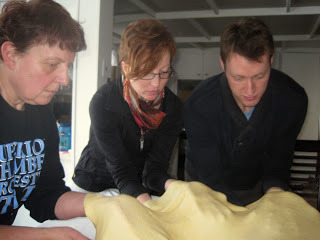
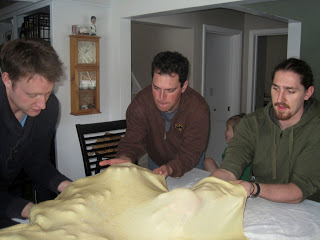
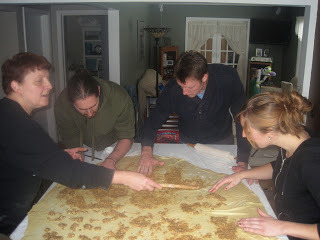
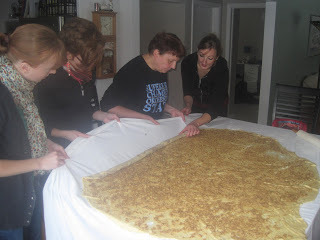
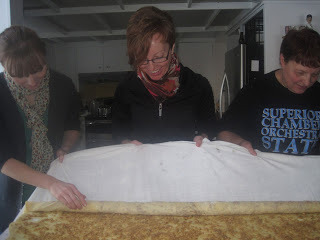
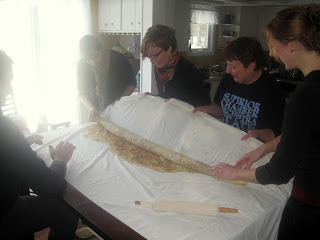
Definitely easy to forget about sitting around the fireplace with your family and loved ones and laughing about that time your brother peed in one of the display toilets at Ace Hardware when he was five years old (right, Josh?).
 I say, don't forget. I say cling to those memories like they are the daily bread and water that sustain you. Not that you should dwell on the past, but you shouldn't just dismiss it like yesterday's newspaper. Keep a clipping. Log away a memory. People tend to ruminate on bad experiences far more than good ones (New York Times, March 23, 2012), so it is important to consciously keep a store of positive memories at the front of your brain. When times are shitty and you swear your fingers are going to snap off one-by-one from the cold, picture a warm thought. One of mine comes from this past Thanksgiving.
I say, don't forget. I say cling to those memories like they are the daily bread and water that sustain you. Not that you should dwell on the past, but you shouldn't just dismiss it like yesterday's newspaper. Keep a clipping. Log away a memory. People tend to ruminate on bad experiences far more than good ones (New York Times, March 23, 2012), so it is important to consciously keep a store of positive memories at the front of your brain. When times are shitty and you swear your fingers are going to snap off one-by-one from the cold, picture a warm thought. One of mine comes from this past Thanksgiving.I ventured north to Duluth (like I do almost every Thanksgiving) and stayed with my aunt and uncle. Thanksgiving is my favorite holiday anyway, but this year was extra-special. We made potica. Maybe some of you with Slovenian ancestry know what I'm talking about. For those of you who don't, here's the deal: It's a type of sweet bread that basically takes all day to make. You prepare the dough, let it sit, roll it out on a table, stretch it (by hand, pulling from the middle) so that it is crepe-paper thin, and then cover it with walnuts, honey, and other sweet goodness, roll it up into a doughy snake, then coil it and bake. And then enjoy. It's absolutely delicious and really, pretty fun to make.
So, that's one memory that will feed me for a while. Good luck finding yours.
-Kate








Published on December 30, 2012 20:55
December 24, 2012
The Best Christmas Present Ever!
The one present that's always on my list: a good book!
Give the gift of adventure, imagination, and escape to someone you love this year. Give a book.

Merry Christmas and Happy Holidays,
Kate
Give the gift of adventure, imagination, and escape to someone you love this year. Give a book.

Merry Christmas and Happy Holidays,
Kate
Published on December 24, 2012 14:20
December 21, 2012
"We're Beginning a New Cycle" -Solomon, the Mayan Shaman
Still alive today? Don't be surprised. Solomon isn't.
According to Hollywood hype and end-of-the-world sensationalists, the world was scheduled to end this morning at around 5 a.m. The rumor is that the Mayan calendar mysteriously ends on December 21st, 2012, which signals the end of the world and the destruction of all things. People have called it a prophecy or a prediction. But is that ever what it was meant to be? Did Mayans actually think the world was going to end in 2012? According to many Mayans, no.
They believe this is the end of a cycle and the beginning of a new one. Just like seasons and years spiral on, so do the cycles in the Mayan calendar.
One Mayan man set me straight on his (and his people's) beliefs a few years ago. His name is Solomon.
 Julie and Katie: Adventure Buddies
Julie and Katie: Adventure Buddies
I met Solomon while traipsing around the ruins of Tikal in Guatemala with my adventure buddies, Julie and Katie. We had slept in hammocks the night before and got up early to watch the sunrise over the 200 foot tall pyramids. As the sun peeked over the tips of the ancient stone structures and howler monkeys cried through the forest, I had a feeling it was going to be an amazing day. It was. And Solomon was a huge part of it.
We met Solomon outside of the ruins of the royal palace. He was sweeping dead leaves off the path with a rake he had fastened out of a bundle of sticks. When I saw him, I noticed several necklaces hanging from his neck and said in Spanish, "I like that fish necklace. Are you a Pisces?"
That was all it took to get Solomon chatting. He started talking to us in rapid Spanish about his life as a Mayan shaman (spiritual healer), his emigration from Mexico, the secret tunnels that lie underneath the Tikal ruins (apparently larger and more impressive than the ruins above ground), and his thoughts about 2012. As I translated for Katie and Julie, I wondered where he was going with all his chatter. Was he trying to preach to us about the end of the world? Was he going to tell us about the doom and gloom of end times? I had heard all of that before and frankly wasn't in the mood for such a depressing topic. I wanted to continue climbing the ruins and watching the coatis snuffle around the underbrush. But Solomon surprised me.
"El mundo no va a terminar," he said bluntly.
I stopped translating.
"What?" I said. "En serio? You don't think the world is going to end?"
 Solomon and I next to the Elephant Tree"No," he replied. "I think 2012 signals the end of a cycle. A transition. We will end this greedy, war-driven cycle and start a new one in which people share and give, and there is tranquility and peace in the world."
Solomon and I next to the Elephant Tree"No," he replied. "I think 2012 signals the end of a cycle. A transition. We will end this greedy, war-driven cycle and start a new one in which people share and give, and there is tranquility and peace in the world."
The three of us were stunned. We thought all Mayans believed the world would end in 2012 and to hear this contradiction straight from the source was a little shocking.
Solomon went on to say, "But not everyone will be a part of this new world. There will be a division on earth. Some people will continue to live a material exist and thrive on greed and excess. The rest are the enlightened ones and they will step through a gateway of light (looking back, I'm sure he meant this metaphorically) and live peacefully with one another."
"And how do I know if I'm an enlightened one?" I asked.
"You are," he replied. "You are because you are listening to my words with an open heart."
We spent a good chunk of the afternoon with Solomon--listening to his advice, taking part in a traditional cleansing ceremony, visiting a sacred "elephant tree" that keeps water in its trunk, no matter how dry the weather. It was surreal. It was mystical.
The next day we were back to our normal routine--drinking Gallo beer and bartering in the markets. But Solomon's message never really left us. We would talk about him, jokingly sometimes, but his words had a lasting effect. I still think about him from time to time and wonder what he's up to...or if he is even still alive. In 2010 he was 92 years old. Nine decades on this earth. I wouldn't be shocked if he lived three decades more.
 THIS is a coati...probably the cutest animal aliveSo no, I was not surprised that the world didn't end this morning. And neither was Solomon.
THIS is a coati...probably the cutest animal aliveSo no, I was not surprised that the world didn't end this morning. And neither was Solomon.
But am I feeling enlightened? Do I feel like I've stepped through a gateway of light? Maybe not. Maybe nothing so dramatic. But I do think my first day in the "new cycle" is off to a great start. I am surrounded by people I love and care about; I have a comfortable apartment and enough to eat; I am writing again; I am healthy. That is enough light for me.
According to Hollywood hype and end-of-the-world sensationalists, the world was scheduled to end this morning at around 5 a.m. The rumor is that the Mayan calendar mysteriously ends on December 21st, 2012, which signals the end of the world and the destruction of all things. People have called it a prophecy or a prediction. But is that ever what it was meant to be? Did Mayans actually think the world was going to end in 2012? According to many Mayans, no.
They believe this is the end of a cycle and the beginning of a new one. Just like seasons and years spiral on, so do the cycles in the Mayan calendar.
One Mayan man set me straight on his (and his people's) beliefs a few years ago. His name is Solomon.
 Julie and Katie: Adventure Buddies
Julie and Katie: Adventure BuddiesI met Solomon while traipsing around the ruins of Tikal in Guatemala with my adventure buddies, Julie and Katie. We had slept in hammocks the night before and got up early to watch the sunrise over the 200 foot tall pyramids. As the sun peeked over the tips of the ancient stone structures and howler monkeys cried through the forest, I had a feeling it was going to be an amazing day. It was. And Solomon was a huge part of it.
We met Solomon outside of the ruins of the royal palace. He was sweeping dead leaves off the path with a rake he had fastened out of a bundle of sticks. When I saw him, I noticed several necklaces hanging from his neck and said in Spanish, "I like that fish necklace. Are you a Pisces?"
That was all it took to get Solomon chatting. He started talking to us in rapid Spanish about his life as a Mayan shaman (spiritual healer), his emigration from Mexico, the secret tunnels that lie underneath the Tikal ruins (apparently larger and more impressive than the ruins above ground), and his thoughts about 2012. As I translated for Katie and Julie, I wondered where he was going with all his chatter. Was he trying to preach to us about the end of the world? Was he going to tell us about the doom and gloom of end times? I had heard all of that before and frankly wasn't in the mood for such a depressing topic. I wanted to continue climbing the ruins and watching the coatis snuffle around the underbrush. But Solomon surprised me.
"El mundo no va a terminar," he said bluntly.
I stopped translating.
"What?" I said. "En serio? You don't think the world is going to end?"
 Solomon and I next to the Elephant Tree"No," he replied. "I think 2012 signals the end of a cycle. A transition. We will end this greedy, war-driven cycle and start a new one in which people share and give, and there is tranquility and peace in the world."
Solomon and I next to the Elephant Tree"No," he replied. "I think 2012 signals the end of a cycle. A transition. We will end this greedy, war-driven cycle and start a new one in which people share and give, and there is tranquility and peace in the world."The three of us were stunned. We thought all Mayans believed the world would end in 2012 and to hear this contradiction straight from the source was a little shocking.
Solomon went on to say, "But not everyone will be a part of this new world. There will be a division on earth. Some people will continue to live a material exist and thrive on greed and excess. The rest are the enlightened ones and they will step through a gateway of light (looking back, I'm sure he meant this metaphorically) and live peacefully with one another."
"And how do I know if I'm an enlightened one?" I asked.
"You are," he replied. "You are because you are listening to my words with an open heart."
We spent a good chunk of the afternoon with Solomon--listening to his advice, taking part in a traditional cleansing ceremony, visiting a sacred "elephant tree" that keeps water in its trunk, no matter how dry the weather. It was surreal. It was mystical.
The next day we were back to our normal routine--drinking Gallo beer and bartering in the markets. But Solomon's message never really left us. We would talk about him, jokingly sometimes, but his words had a lasting effect. I still think about him from time to time and wonder what he's up to...or if he is even still alive. In 2010 he was 92 years old. Nine decades on this earth. I wouldn't be shocked if he lived three decades more.
 THIS is a coati...probably the cutest animal aliveSo no, I was not surprised that the world didn't end this morning. And neither was Solomon.
THIS is a coati...probably the cutest animal aliveSo no, I was not surprised that the world didn't end this morning. And neither was Solomon.But am I feeling enlightened? Do I feel like I've stepped through a gateway of light? Maybe not. Maybe nothing so dramatic. But I do think my first day in the "new cycle" is off to a great start. I am surrounded by people I love and care about; I have a comfortable apartment and enough to eat; I am writing again; I am healthy. That is enough light for me.
Published on December 21, 2012 05:55
December 12, 2012
Standing Sideways on the Earth: A Free Write
Standing Sideways on the Earth
Standing sideways on the earth,Sprouting out from her belly like zitsOr hairs that stand on end,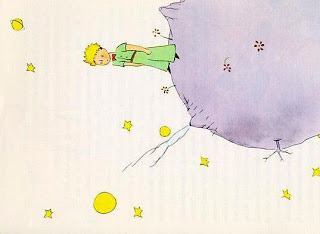 "The Little Prince" standing sideways on his planetWe live.
"The Little Prince" standing sideways on his planetWe live.
Do we think about the way we’re standing,Standing sideways on the earth,Sprouting out from her belly like zitsOr hairs that stand on end?
Most likely we don’t,Don’t think about the wayWe spring from the earth.Don’t think about the angle we makeWhen you see us from space.
Most likely we just live,Live sideways,Live ninety degrees or forty-five,Thinking thoughts that don’t make us quite as dizzyAs thinking about living sideways on the earth.Most likely we just live.
Standing sideways on the earth,Sprouting out from her belly like zitsOr hairs that stand on end,
 "The Little Prince" standing sideways on his planetWe live.
"The Little Prince" standing sideways on his planetWe live.Do we think about the way we’re standing,Standing sideways on the earth,Sprouting out from her belly like zitsOr hairs that stand on end?
Most likely we don’t,Don’t think about the wayWe spring from the earth.Don’t think about the angle we makeWhen you see us from space.
Most likely we just live,Live sideways,Live ninety degrees or forty-five,Thinking thoughts that don’t make us quite as dizzyAs thinking about living sideways on the earth.Most likely we just live.
Published on December 12, 2012 15:55
November 29, 2012
The Importance of Space
The beginning of the month was chaos. Boxes everywhere, an overly big (and accident prone) moving truck, piles of clothes and shoes on the floor, a huge gap in my room where a bed should have been...
Moving is tough. Any kind of change of environment is tough. When we are surrounded by disorder and newness, it is easy to lose ourselves in the offending space. It is easy to become discouraged. Earlier this month, I remember sitting next to a mound of clothing, sorting through it sock-by-sock, and thinking, "Good grief, when did I accumulate so many tank tops?"
 Assembling my desk...Dobby felt a little neglected!But these steps are necessary--the sorting, the putting away, the ordering of toiletries, the creation of a system. Without these steps, things get shoved aside for later and continue to linger in the backs of our minds.
Assembling my desk...Dobby felt a little neglected!But these steps are necessary--the sorting, the putting away, the ordering of toiletries, the creation of a system. Without these steps, things get shoved aside for later and continue to linger in the backs of our minds.
The very root of Feng Shui (and if you don't buy into any other part of the concept, buy into this...) is the creation of order and the removal of clutter. The idea is that human beings function best in a clean, ordered, and uncomplicated environment. Our bodies relax; our minds are put at ease; we are free to concentrate on things outside or our space--higher purposes. Like writing.
Unfortunately, my writing took a blow this past November (ironic, since it is national novel-writing month). I had trouble focusing in my new space. I struggled to carve out an area in which I could write and work and concentrate. But eventually, it did happen. I built a desk; I bought a chair; I found homes for all my dishes, sweaters, hair products. The beast with walls and floors and ceiling began to feel less like a container and more like a home.
 Bedroom organizationI found my mind relaxing, and then it went beyond relaxation: it started to think creatively again. I started to see the world in colors and textures, instead of in a Sin City-type black and white (slightly evil, extremely jarring). My mind was back; my motivation was back. Words began to flow. And I learned a valuable lesson about the importance of space. It might seem like an insignificant factor in our daily productivity and creativity, but our surroundings can have an eerie kind of power over us. Don't let it take the reins. It is up to you to tame your space, make it your own, and make it work for you.
Bedroom organizationI found my mind relaxing, and then it went beyond relaxation: it started to think creatively again. I started to see the world in colors and textures, instead of in a Sin City-type black and white (slightly evil, extremely jarring). My mind was back; my motivation was back. Words began to flow. And I learned a valuable lesson about the importance of space. It might seem like an insignificant factor in our daily productivity and creativity, but our surroundings can have an eerie kind of power over us. Don't let it take the reins. It is up to you to tame your space, make it your own, and make it work for you.
Happy organizing ;)
 My Office
My Office 
Moving is tough. Any kind of change of environment is tough. When we are surrounded by disorder and newness, it is easy to lose ourselves in the offending space. It is easy to become discouraged. Earlier this month, I remember sitting next to a mound of clothing, sorting through it sock-by-sock, and thinking, "Good grief, when did I accumulate so many tank tops?"
 Assembling my desk...Dobby felt a little neglected!But these steps are necessary--the sorting, the putting away, the ordering of toiletries, the creation of a system. Without these steps, things get shoved aside for later and continue to linger in the backs of our minds.
Assembling my desk...Dobby felt a little neglected!But these steps are necessary--the sorting, the putting away, the ordering of toiletries, the creation of a system. Without these steps, things get shoved aside for later and continue to linger in the backs of our minds.The very root of Feng Shui (and if you don't buy into any other part of the concept, buy into this...) is the creation of order and the removal of clutter. The idea is that human beings function best in a clean, ordered, and uncomplicated environment. Our bodies relax; our minds are put at ease; we are free to concentrate on things outside or our space--higher purposes. Like writing.
Unfortunately, my writing took a blow this past November (ironic, since it is national novel-writing month). I had trouble focusing in my new space. I struggled to carve out an area in which I could write and work and concentrate. But eventually, it did happen. I built a desk; I bought a chair; I found homes for all my dishes, sweaters, hair products. The beast with walls and floors and ceiling began to feel less like a container and more like a home.
 Bedroom organizationI found my mind relaxing, and then it went beyond relaxation: it started to think creatively again. I started to see the world in colors and textures, instead of in a Sin City-type black and white (slightly evil, extremely jarring). My mind was back; my motivation was back. Words began to flow. And I learned a valuable lesson about the importance of space. It might seem like an insignificant factor in our daily productivity and creativity, but our surroundings can have an eerie kind of power over us. Don't let it take the reins. It is up to you to tame your space, make it your own, and make it work for you.
Bedroom organizationI found my mind relaxing, and then it went beyond relaxation: it started to think creatively again. I started to see the world in colors and textures, instead of in a Sin City-type black and white (slightly evil, extremely jarring). My mind was back; my motivation was back. Words began to flow. And I learned a valuable lesson about the importance of space. It might seem like an insignificant factor in our daily productivity and creativity, but our surroundings can have an eerie kind of power over us. Don't let it take the reins. It is up to you to tame your space, make it your own, and make it work for you.Happy organizing ;)
 My Office
My Office
Published on November 29, 2012 20:40
November 1, 2012
Inspiration: Regina Spektor
It's been a couple of weeks since I went to her show at the Minneapolis State Theater and Regina is still humming in my head:

They'll name a city after us
And later say it's all our fault
Then they'll give us a talking to
Then they'll give us a talking to
'cause they have years of experience
Living in a den of thieves
Rummaging for answers in the pages
Living in a den of thieves
And it's contagious
And it's contagious...
(from the song Us, one of my favs)
I find it natural to draw inspiration from music, especially music from artists like Regina Spektor whose voice springs from her soul. She paints the air with her rich tones; she tickles the brain with her lyrics. She is sarcastic. She is serious. Every song she sings is a mini book. A novella. I can picture the characters and situations as she sings them. For instance:
 A man walks out of his apartment,
A man walks out of his apartment,
It is raining, he's got no umbrella
He starts running beneath the awnings,
Trying to save his suit,
Trying to save his suit.
Trying to dry, and to dry, and to dry, but no good
Or "Reading Time with Pickle." Or "All the Row Boats." Many of Regina's songs conjure up vivid images that have fantastic sticking power. She thinks about the world in unique ways and describes ordinary events in unusual terms. For instance, in "Braille," she talks about her subject "lying on the floor and counting stretch marks," as if the woman in her song is reading her skin.
 Regina Spektor is my Gabriel Garcia Marquez of music. In her world, men sell butterflies out of trench coats, birds complain about weariness, and the Bible's Sampson eats Wonderbread.
Regina Spektor is my Gabriel Garcia Marquez of music. In her world, men sell butterflies out of trench coats, birds complain about weariness, and the Bible's Sampson eats Wonderbread.
And that's ok. There are too many mundane ways to tell a story.
Better to detach your mind from the "shoulds" and "musts" and think about the "what ifs." What if I tell a story from this angle instead of that one? What if I think about things from this point of view instead of that one? What if birds could talk? What if Wonderbread was around in Biblical times? Or Sampson is around in modern times? What if words had color?
This entry has been a bit of an abstract ramble, but I hope you understand my main point. It is healthy to think about the world in unique ways and challenge normalcy. Regina Spektor does this exceedingly well and I draw on the power of her voice and her lyrics as a source of inspiration. To close:
On the radio
We heard November rain
That solo's awful long
But it's a good refrain
You listen to it twice
'cause the DJ is asleep
On the radio...

Thank you, Regina. You are one of many artists that give me strength and inspire me in my writing.
-Kate


They'll name a city after us
And later say it's all our fault
Then they'll give us a talking to
Then they'll give us a talking to
'cause they have years of experience
Living in a den of thieves
Rummaging for answers in the pages
Living in a den of thieves
And it's contagious
And it's contagious...
(from the song Us, one of my favs)
I find it natural to draw inspiration from music, especially music from artists like Regina Spektor whose voice springs from her soul. She paints the air with her rich tones; she tickles the brain with her lyrics. She is sarcastic. She is serious. Every song she sings is a mini book. A novella. I can picture the characters and situations as she sings them. For instance:
 A man walks out of his apartment,
A man walks out of his apartment,It is raining, he's got no umbrella
He starts running beneath the awnings,
Trying to save his suit,
Trying to save his suit.
Trying to dry, and to dry, and to dry, but no good
Or "Reading Time with Pickle." Or "All the Row Boats." Many of Regina's songs conjure up vivid images that have fantastic sticking power. She thinks about the world in unique ways and describes ordinary events in unusual terms. For instance, in "Braille," she talks about her subject "lying on the floor and counting stretch marks," as if the woman in her song is reading her skin.
 Regina Spektor is my Gabriel Garcia Marquez of music. In her world, men sell butterflies out of trench coats, birds complain about weariness, and the Bible's Sampson eats Wonderbread.
Regina Spektor is my Gabriel Garcia Marquez of music. In her world, men sell butterflies out of trench coats, birds complain about weariness, and the Bible's Sampson eats Wonderbread. And that's ok. There are too many mundane ways to tell a story.
Better to detach your mind from the "shoulds" and "musts" and think about the "what ifs." What if I tell a story from this angle instead of that one? What if I think about things from this point of view instead of that one? What if birds could talk? What if Wonderbread was around in Biblical times? Or Sampson is around in modern times? What if words had color?
This entry has been a bit of an abstract ramble, but I hope you understand my main point. It is healthy to think about the world in unique ways and challenge normalcy. Regina Spektor does this exceedingly well and I draw on the power of her voice and her lyrics as a source of inspiration. To close:
On the radio
We heard November rain
That solo's awful long
But it's a good refrain
You listen to it twice
'cause the DJ is asleep
On the radio...

Thank you, Regina. You are one of many artists that give me strength and inspire me in my writing.
-Kate
Published on November 01, 2012 07:37
October 16, 2012
Ten Thousand Lines: An Explanation and an Excerpt
Many of you have expressed interest in my second book, Ten Thousand Lines. I am over halfway through writing it (at least I think I am...you can never be sure!), so I feel confident enough to divulge a little more information. When a book is in its infancy, it's a little scary to talk too much about it because so many things can change or transform--characters, plot, even the ending can radically shift. Ten Thousand Lines is no longer in its infancy. It is 157 pages old. I think it's about time to reveal a little more:
 The Idea:
The Idea:Some of you have noticed the tiny print in the back of my first book, Elmer Left, that says "Coming soon from Kate Leibfried: Ten Thousand Lines, A dysyopian novel inspired by the lyrics of Ben Cooper." Allow me to demystify.
Ben Cooper is a musician based out of Florida who dabbles in several different projects (solo and otherwise). The albums that I know and love best were recorded under the names Radical Face and Electric President (please check them out! Absolutely amazing artistry). His music has an ethereal, almost ghostly feel and it captivated me from the get-go.
When I decided to move back home from Portland, OR in fall of 2009, I had many long stretches where I would do nothing but listen to music and sing my lungs out. Somewhere in the mountains of western Idaho, I flipped my mp3 player to the self-titled Electric President album. I listened; I paid attention. A story began to form in my brain. Certain words from his songs leapt out at me and created a chain of images I could not ignore. They cohered together. They fit. I began to imagine one main character walking through the songs--a man who lived in a gray, oppressive world and had wires under his skin.
I knew I was onto something amazing. I listened to the album again and the idea grew stronger. The details and images in Cooper's music seemed to be a part of something larger. I had to tell their story.
When I arrived at my hotel on the eastern edge of Idaho, I wasted no time. I whipped out my laptop, opened Word, and starting furiously typing. In about fifteen minutes, I had sketched out the general idea of the book I knew I was going to write. Three years later, I started writing it in earnest.
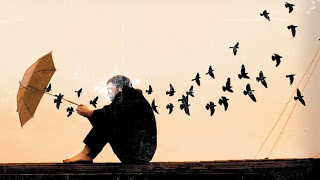 The Plot:
The Plot:I don't want to give too much away, so here are the basics:
The time is about two hundred years in the future; the place is planet earth. Various chains of events have led to a sharp division between the wealth elite (the Superbanites) and the vast lower class (the Workers). The Superbanites live safely in an enclosed dome away from the Workers and only interact with them when they are acting as their superiors on the factory floor/corn field/coal mine. Workers are bred and raised to do one thing: work. They live in a drug-induced haze that allows them to tirelessly harvest fields, assemble door frames, or do whatever menial task they have been assigned to do for their entire lives. They live and work in huge domes called Hives. The Hives feed Superbia.
This futuristic world hangs in a delicate balance. Most Superbanites don't worry about the balance; they are too busy enjoying themselves inside their plexiglass bubble. But some Superbanites worry. Some Superbanites understand how fragile their world actually is.
Ten Thousand Lines begins with a disruption to the delicate balance. A Worker is somehow awake.
The Excerpt:
On the glass, I trace the sun with my thumb. It sinks into the ground. Nightfall. Nightfall and everyone is asleep. They sleep as if yesterday had not happened, as if yesterday was a dream. I am pretty sure it was not. I hold my thumb to the glass as if it is soaking up lingering rays, feeding them into my gray organs, tanning my gray skin. It’s no use. My skin will remain gray. It was designed to be that way: gray and UV resistant. Convenient, practical skin.I slide my thumb slowly down the window pane and listen to the sqreeeee on the glass. It isn’t a loud noise, but the sound cuts through the silent air like the midday factory whistles: shrill and pervasive. I instantly regret making the noise and freeze my hand, mid-slide. My shoulders tense and I keep corpse-still, listening for footsteps at my back, waiting to be caught. The footsteps never come and the air around me continues to be saturated with a hundred sets of breathing lungs, a hundred shifting bodies, a thousand buzzing wires. I relax and lower my hand to my thigh. They are asleep. Just like any ordinary, quiet night, they are asleep. I am not. I am awake. For the first time in my life, I am awake. I sit on the metallic ledge of the window, watching the horizon turn from dusty tan to brown to charcoal-gray. I have never before watched the sunset. I have never had the chance. Or the interest. When it was bedtime, I went to bed. Everyone did. Why shouldn’t I? It was routine. It was practical. We all had to recharge for the next day’s work. Bedtime was practical; it was routine. Everyone did it. Why shouldn’t I?Any trace of light is gone now. I have never seen the sky so dark. The dark is mesmerizing. It looks clean and immense. I am used to shades of gray, not black. Never anything so black and deep. It keeps going, going. And then the stars are blinking, like kids who are staring into the wind. I look at the stars; I think of the kids blinking. I have seen this image once—kids blinking, flying their kites as wind whipped around their faces. I laughed at the time, not understanding wind, not understanding children. I didn’t bother much with the image then; it didn’t trouble me. It was just another image passing along the Screen. Just another silly image to make the time pass. To be honest, I still don’t understand them fully—the wind and the kite and the kids, that is. They don’t make sense in my world. They are foreign bodies, outsiders. Like gravel in your shoe. I am familiar with that. It happened to me once when I was on the outskirts of the Hive.At the time, I didn’t know gravel existed inside the Hive. I was sent to its edge one time—to retrieve a shipment of minerals, I believe—and as I heard the train coming, I stepped away from the tracks, into bits of tiny rocks that framed the railway. I remember tripping, crying out. The Overseer ran towards me, picked me up, asked me if I was ok. I said yes. He asked if I knew what I had just stepped on. I said no. He said gravel, my Worker. Those bits of rock are called gravel.“Why would anyone make a surface so uneven?” I asked.“That’s what they did in the old days,” he replied. “We are better now. We don’t have to deal with inconvenient things like gravel and uneven surfaces.”“That is good,” I replied and carried on with my day. I might not have remembered the incident at all if bits of rock hadn’t fallen out of my shoe at bedtime. “What is that?” the Worker in bed 24D asked.“It is gravel,” I replied. “Overseer said so.”“Oh,” said the Worker in bed 24D and climbed into bed.I climbed into bed as well.But tonight I don’t sleep—I can’t take my eyes off the depth of the night sky and the blinking stars. I can’t sleep because I am awake for the first time, aware of the stars and the dark, dark sky. I sit on the ledge for a long time, not sleeping, just watching and listening. The rhythm of the breathing bodies, the whir and chug of the recharge machines should lull me to sleep, but they do not. I can’t think of sleeping when there is so much to see, so much to watch and listen to and absorb.In our Hive—Hive 14—there is no light during the late hours. There is no need for light. Nobody is awake; nobody is walking down the streets. It would be pointless to have light. No one would use it. But this night, the night of the blinking stars, I would have made good use of light. I would have lighted a path at my feet so that I could walk down the even, straight roads of Hive 14 and wander into empty buildings and see the factory when it is shut down for the night. Perhaps it looks the same as it does in the daytime, but if I saw it I would know for sure. As I think of these things—the darkness and factory at night and the lack of light during the late hours—I begin to wonder why I haven’t thought of them before. And then I begin to wonder why I had been asleep before yesterday—asleep in a sense. Clearly, I was functioning every day with my eyelids open and my body vertical, but I was seeing nothing. And then yesterday happened and everything changed. I will not go back to sleep again.
Thank you for reading. Your feedback is welcome.-Kate
Published on October 16, 2012 06:04
October 2, 2012
FightForTheWrite Gets Political
Here is a visual exploration of the "sanctity of heterosexual marriage" people keep talking about. Enjoy.
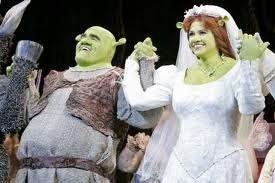
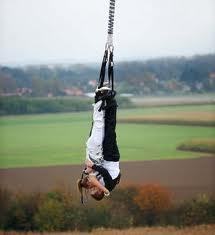

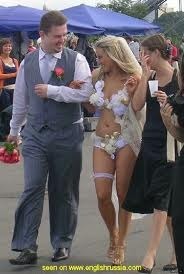


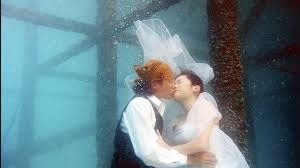


Sanctity? Hmmm.
Equal rights for all.
(Including the right to have bat-shit crazy weddings!)









Sanctity? Hmmm.
Equal rights for all.
(Including the right to have bat-shit crazy weddings!)
Published on October 02, 2012 06:34




